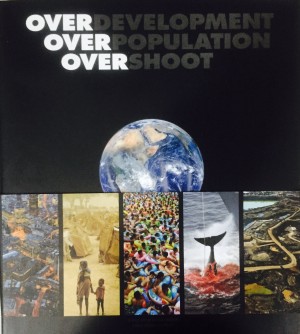Population growth not a blessing, says Population Institute CEO

This photo taken from the coffee table book “Overdevelopment, Overpopulation, Overshoot” shows overcrowding in Haiti.
When it comes to the long-debated issue of overpopulation, lack of understanding and not of knowledge has always been the main problem.
This was the central message of “Overdevelopment, Overpopulation, Overshoot,” a coffee table book on the “deep complex nuances of today’s overpopulated world.”
Population Media Center president William Ryerson said the present generation has been fed with a lot of statistical data on the ballooning number of people across the globe, but added these factual backings were not enough to generate social action.
“Such data, while useful, fails to generate mass concern about the fundamental issue affecting the future of the earth,” said Ryerson, who is also the chief executive officer of Population Institute.
Global Fund for Women CEO Musimbi Kanyoro echoed Ryerson’s claims, saying insensitivity and a “lack of discernment” had been preventing initiatives to craft policies that would address population growth.
Article continues after this advertisement“Our problem is not ignorance. We are drowning in knowledge,” the Kenya native said. “Perhaps we lack discernment, or else we are simply too selfish to care for the future of those to come after us.”
Article continues after this advertisementIt was in this regard that the idea of publishing a coffee table book materialized, with the publishers believing that thought-provoking images could convey the message more effectively than statistical claims alone.
Expressing alarm over the supposed negative impacts of overpopulation to biodiversity, Ryerson said the population debate was not actually about the number of people that could fit in a specific area: “The crucial question is: How many people can the earth sustain, at a reasonable standard of living, while leaving room for the diversity of life to flourish?”
“If we cannot live sustainably with 7.2 billion people, how are we going to support billions more by the end of this century?” he said, noting that the global demand for food had been projected to rise by 70 to 100 percent in the next 40 years.
With the aid of powerful photos, Ryerson said the book was particularly aimed at destroying the notion the earth and its resources were boundless.
“Given a planet with infinite space and resources, population growth could, arguably, be a blessing. We do not live on such planet,” he said. “Many of us today do recognize the earth and its resources are limited, yet too many people still cling to the notion that modern science and technology will enable us to defy physical limits.”
Citing maternal health, dignity of women, and larger societal issues, Kanyoro said the consequences of overpopulation were not limited to physical damages.
“We know that rapid overpopulation growth exacerbates social, economic, and ecological problems—whether in rich or poor countries, north or south,” she said. “Most importantly, rapid population growth is a fundamental driver of individual as well as societal problems that deny dignity especially to women, who bear the burden of reproduction and caretaking of communities.”
Both Ryerson and Kanyoro highlighted the importance of family planning in addressing the overpopulation, adding the
government should expand access to contraceptives to reduce cases of unplanned pregnancies.
“Family planning is not about telling people what to do, but about listening to what they want,” Kanyoro said. “Over 200 million people couples around the world want to limit the children they have, but are not using contraception, and every woman wants and deserves a safe delivery.”
The contributors also urged the government and the public alike to “embrace common responsibility” and take concrete steps in stopping overpopulation by legislating measures and cooperating in their implementation.
These “rights-based, culturally appropriate” measures would not only slow population growth but would also protect human dignity, Kanyoro said.
“While the complexities and challenges of achieving this are quite real, the problem of rapid population growth requires that leaders gather collective political will and implement effective policies,” she said. “These times call for an unprecedented level of cooperation and common purpose among genders, cultures, peoples, and nations.” RC


